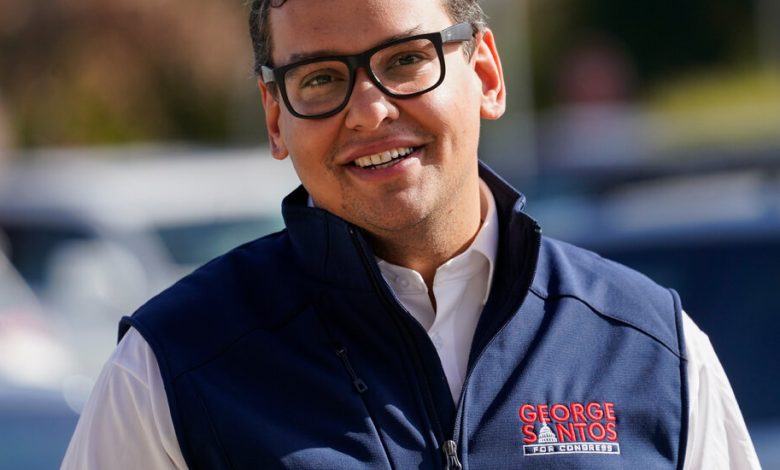Brazilian Authorities Will Revive Fraud Case Against George Santos

When Representative-elect George Santos takes his seat in Congress on Tuesday, he will do so under the shadow of active investigations by federal and local prosecutors into potential criminal activity during his two congressional campaigns.
But an older criminal case may be more pressing: Brazilian law enforcement authorities intend to revive fraud charges against Mr. Santos, and will seek his formal response, prosecutors told The New York Times on Monday.
The matter, which stemmed from an incident in 2008 regarding a stolen checkbook, had been suspended for the better part of a decade because the police were unable to locate him.
Nathaly Ducoulombier, a spokeswoman for the Rio de Janeiro prosecutor’s office, said that with Mr. Santos’s “whereabouts identified,” a formal request will be made to the U.S. Justice Department to notify him of the charges, a necessary step after which the case will proceed with or without him.
The criminal case in Brazil was first disclosed in a New York Times investigation that uncovered broad discrepancies in his résumé and questions about his financial dealings.
Just a month before his 20th birthday, Mr. Santos entered a small clothing store in the Brazilian city of Niterói outside Rio de Janeiro. He spent nearly $700 using a stolen checkbook and a false name, court records show.
Mr. Santos admitted the fraud to the shop owner in August 2009, writing on Orkut, a popular social media website in Brazil, “I know I screwed up, but I want to pay.” In 2010, he and his mother told the police that he had stolen the checkbook of a man his mother used to work for, and used it to make fraudulent purchases.
A judge approved the charge in September 2011 and ordered Mr. Santos to respond to the case. But by October, he was already in the United States and working at Dish Networkin College Point, Queens, company records show.
Despite his earlier confessions, Mr. Santos has recently denied any criminal involvement, telling The New York Post, “I am not a criminal here — not here or in Brazil or any jurisdiction in the world.”
Joe Murray, a lawyer for Mr. Santos, said on Monday, “I am in the process of engaging local counsel to address this alleged complaint against my client.”
Mr. Santos’s swearing-in on Tuesday as the representative of New York’s Third Congressional District was already set to take place amid a cloud of scrutiny.
Last week, The New York Times reported irregularities in Mr. Santos’s campaign spending, including $40,000 on flights and payments for rent that are linked to an address where Mr. Santos is reported to be staying, a possible violation of the ban on using campaign funds for personal expenses.
The Times also disclosed that Mr. Santos had lied about graduating from college and had misled voters about having worked for Citigroup and Goldman Sachs. He also acknowledged owing thousands of dollars in unpaid rent, and withdrew his claim that he owned multiple properties.
The next step for Brazilian prosecutors is to file a petition when the courts reopen at the end of the week requesting that Mr. Santos respond to the charges against him. A judge would then share the request, called a rogatory letter, with the federal Justice Ministry in Brazil, which would share it with the U.S. Department of Justice.Neither the Justice Department nor Brazilian authorities can compel Mr. Santos to respond at this point. But Mr. Santos must be officially notified in order for the case to proceed.
A criminal conviction, even for a felony, is not on its own an act that would disqualify a congressional member from holding office. The last time a member of Congress was removed from office for breaking the law was in 2002, when James A. Traficant Jr. was removed from the House after his conviction on felony racketeering and corruption charges.
If Mr. Santos does not present a defense in the Brazilian case, he will be tried in absentia. If found guilty, Mr. Santos could receive up to five years in prison, plus a fine.
Manuela Andreoni and Michael Gold contributed reporting.
